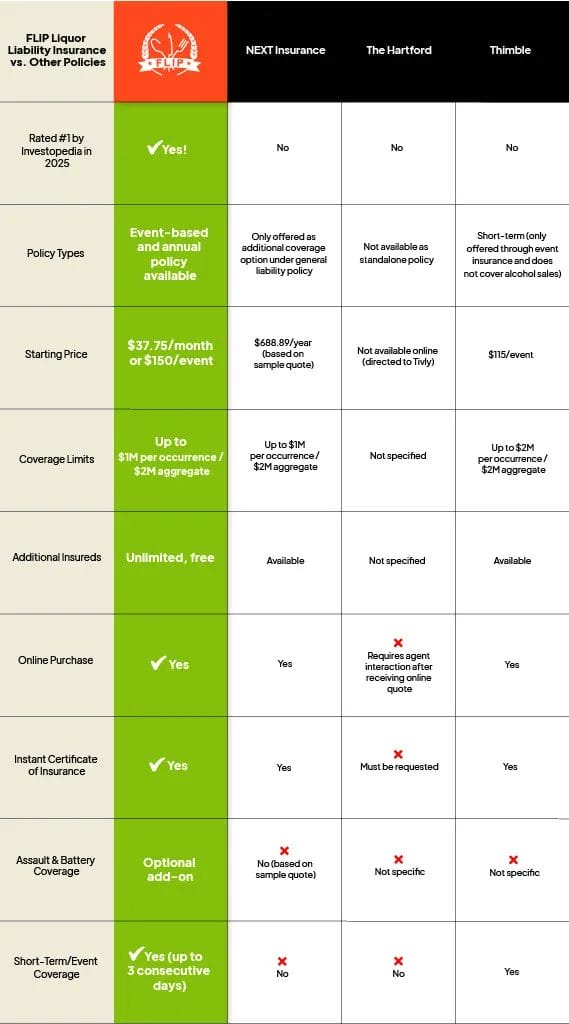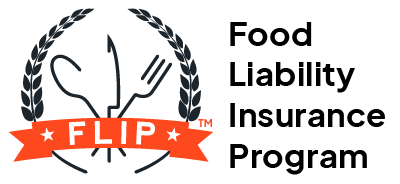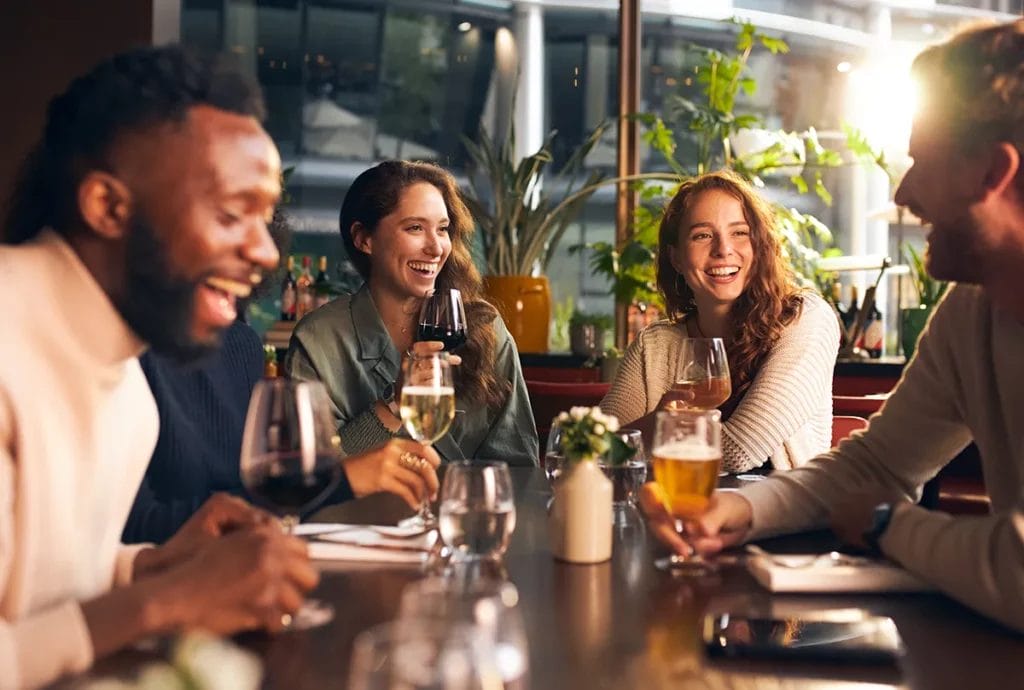House Bill 3430 is shaking things up for the South Carolina bar liquor scene — for the better.
Among other changes, the new law could mean lower liquor liability insurance premiums for businesses that serve alcohol, reducing the financial strain business owners have struggled with since the coverage requirements were put into effect in 2017.
Here’s what you need to know about the new reform’s effects on South Carolina business insurance and how FLIP has you covered through it all.
What’s Changing With South Carolina Liquor Liability Insurance
Liquor liability insurance is designed to cover alcohol-related claims and protect businesses and patrons alike. However, since the Dram Shop Bill of 2017 was enacted, the future of some smaller hospitality businesses has been on the rocks due to rising liability insurance costs overall.
The new law aims to address this by introducing new insurance requirements and liability rules with SC’s business owners in mind.
More Flexible SC Liquor Liability Insurance Requirements
Under HB.3430, for licensed businesses in South Carolina that serve alcohol after 5 p.m. for consumption on the premises:
- The required insurance coverage limit of $1 million is clarified to a $1 million annual aggregate limit ($1 million in total coverage for the policy year)
- The $1 million aggregate limit requirement can be reduced if businesses take steps to lower risk
These are the new risk-reduction options for lowering your business’ required insurance coverage in South Carolina:
- Stop serving alcohol at midnight ($250,000 reduction)
- Make sure all employees complete alcohol server training within 60 days of being hired ($100,000 reduction)
- Keep alcohol sales under 40% of total revenue ($100,000 reduction)
- Use a digital forensic identification system between midnight and 4 a.m. ($100,000 reduction)
Nonprofit organizations or businesses hosting a special event with a temporary alcohol license may qualify for a $500,000 reduction.
Reformed Liability Rules
The new law also limits business’ liability in certain circumstances.
- A person being sued in a civil case may now point to others who may have been partly responsible, even if the other person isn’t part of the lawsuit. If the jury agrees, they can assign the other person a share of the fault, reducing the liability of the original defendant.
- A business cannot be held liable for more than 50% of damages for incidents involving DUIs (previously up to 100%).
If one of your mobile bartenders accidentally overserves a guest who then causes a car accident, your business can only be held liable for up to 50% of those damages. If your employee is sued in a civil case, they can also ask the jury to consider another bar, for example, that may have contributed to the accident.
Real FLIP liquor liability claims examples demonstrate just how much these incidents can cost — with payouts reaching over $1 million.
Mandatory Server Training
The new South Carolina liquor law also establishes a mandatory alcohol server training program. Any person who serves alcohol must complete a certified course recognized by the South Carolina Department of Revenue (SCDOR) with topics such as:
- Liquor liability
- State alcohol laws
- Identifying fake IDs
- Identifying over-served patrons
- Concealed weapons and alcohol
Alcohol server training is also one of the risk mitigation measures for lowering your coverage requirements, so by complying with this step, your business will also be eligible for a $100,000 reduction.

Timeline: Changes to Liquor Liability Insurance in South Carolina
Here’s when your business needs to be compliant with the new South Carolina liquor liability insurance law:
- Law passed: May 8, 2025
- Signed by Governor Henry McMaster: May 12, 2025
- New law effective date: July 1, 2026
Your business must have a liquor liability policy or a general liability policy with a liquor liability endorsement with $1 million in annual aggregate coverage by July 1, 2026. If you complete any of the outlined steps to lower risk, your coverage requirement may be lowered.
What South Carolina Liquor Liability Reform Means for FLIP Policyholders
While other insurers have pulled out of covering the South Carolina liquor industry, FLIP has continued to offer affordable, A+ rated coverage for mobile or independent bartenders and food trucks serving alcohol across the Palmetto State through it all — with minimal premium cost increases since 2017.
Our highest tier of liquor liability coverage remains compliant with the new SC liquor liability insurance law and includes:
- $1 million in coverage per claim
- $2 million in aggregate coverage
This policy exceeds the required liquor liability insurance minimum, giving you peace of mind to stir, shake, and serve with confidence.
Raise a glass to better coverage — FLIP’s liquor liability insurance cost beats the competition.

Ranked #1 for Liquor Liability Insurance by Investopedia
- A+ rated, affordable coverage
- Flexible payment options
- $2,000,000 aggregate limits for general and liquor liability
FAQs About the New SC Liquor Liability Bill
Why Is Liquor Liability So High in South Carolina?
Liquor liability costs in South Carolina have risen in recent years due to a $1 million liquor liability coverage requirement set in place in 2017. Many insurers deemed this requirement too high to offer, leading to fewer insurance options for business owners. The new liquor law aims to address this concern.
What Is the New SC Liquor Insurance Law?
Among other changes, the new SC liquor insurance law clarifies the aggregate insurance requirement to $1 million in annual coverage. It also introduces risk mitigation measures for businesses to lower their coverage requirement.
How Will the SC Liquor Liability Reforms Lower Insurance Premiums?
By limiting the definition of liability and incentivizing responsible service via risk mitigation programs, the reforms aim to reduce claim risks and foster competition, thereby lowering insurance premiums.
What Are the Penalties for Non-Compliance With the New South Carolina Liquor Liability Laws?
Any business that fails to maintain the required coverage may have its permit or license suspended or revoked.

Alex Hastings
Seattle-based copywriter and (WA) licensed insurance agent Alex Hastings leverages her experience as a lover of fast-casual food, baked goods, and iced oat milk lattes. She holds a B.A. in Creative Writing from Western Washington University. Before working at Veracity, she was a retail copywriter at Zulily and an English language teacher in South Korea. Alex is fully trained on FLIP insurance coverages and writes content that connects food and beverage business owners with the policies they need.
Seattle-based copywriter and (WA) licensed insurance agent Alex Hastings leverages her experience as a lover of fast-casual food, baked goods, and iced oat milk lattes. She holds a B.A. in Creative Writing from Western Washington University. Before working at Veracity, she was a retail copywriter at Zulily and an English language teacher in South Korea. Alex is fully trained on FLIP insurance coverages and writes content that connects food and beverage business owners with the policies they need.

Kyle Jude
Kyle Jude is the Program Manager for Food Liability Insurance Program (FLIP). As a dedicated program manager with 10+ years of experience in the insurance industry, Kyle offers insight into different coverages for food and beverage business professionals who are looking to navigate business liability insurance.
Kyle Jude is the Program Manager for Food Liability Insurance Program (FLIP). As a dedicated program manager with 10+ years of experience in the insurance industry, Kyle offers insight into different coverages for food and beverage business professionals who are looking to navigate business liability insurance.

